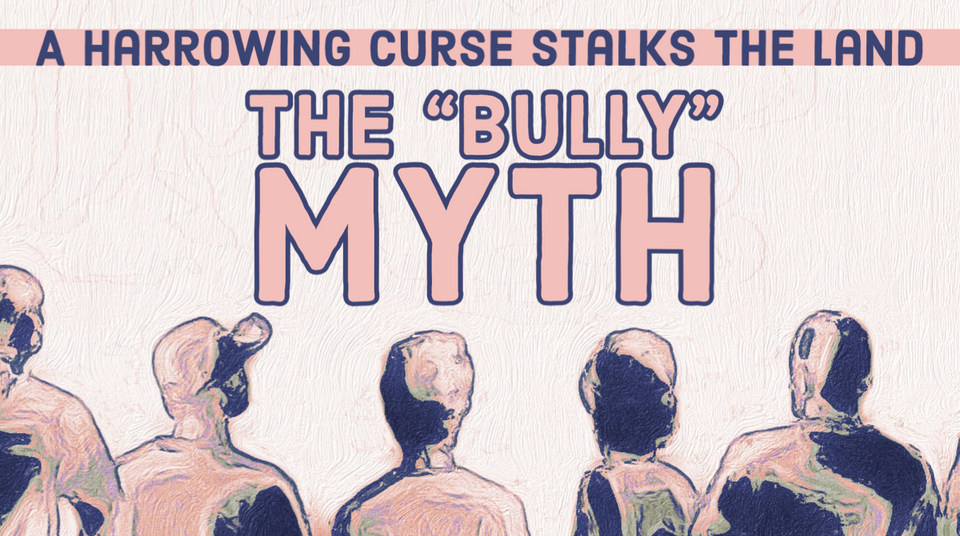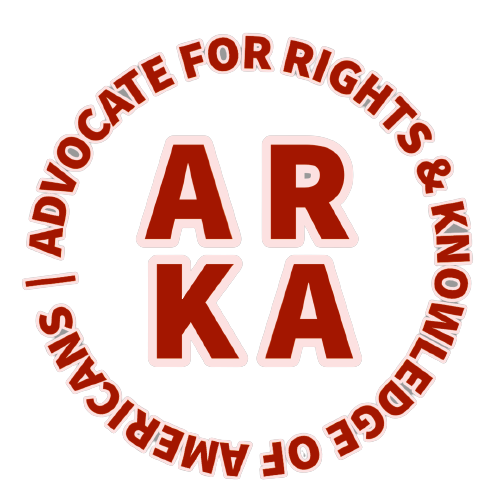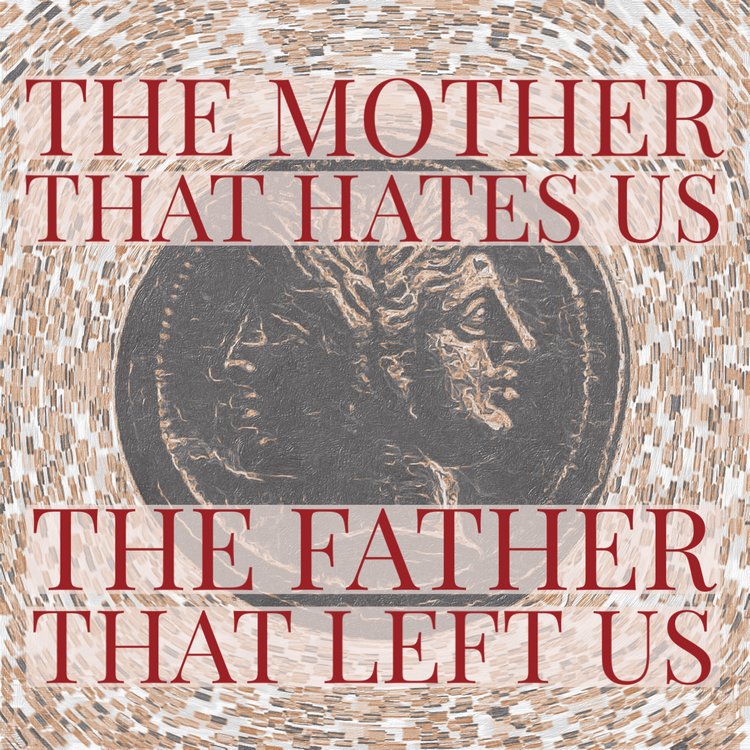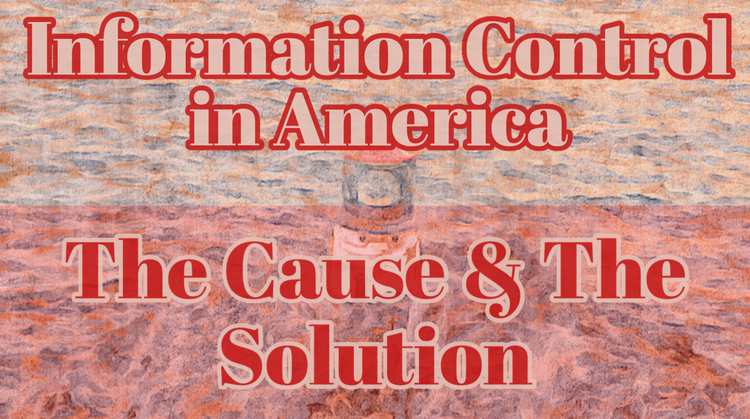A Harrowing Curse Stalks the Land: The "Bully" Myth

A harrowing curse stalks the land, the symptoms of which can be so subtle that it is imperceptible to the layman, and the solution, even more so. Fortunately, the State provides society with divine prophets to interpret the curse's ill-effects and Gifted champions to cast out these foul blights.
Our heroes call themselves psychologists and government officials.
Curses and Extra-bad Curses
Curses keywords:
abuse; attack; bully; crime; depression; harassment; hate; health; neglect; speech; stalking; threats; trolling; victimization; etc 1-3
Extra-bad additional keywords:
child; cyber; dangerous; LGBT youth; gender-targeted, gender-specific; feminist; mental; misogynistic; peer; prevention; speech; virtual; weight-based 1-3
The keywords are from a special organization (iamhere) tasked with international control of information, specifically a series of articles from this organization that appeal to a religion within psychology. While it does not explicitly refer to itself as a religion, it exclusively relies on logical fallacies and ritualistic authority, and if all claims from an ideology are faith-based and rely on ritualistic formalities, then we ought to call it what it is.
Let us consider the act of bullying (though the following arguments hold for other "Curses" as well). Bullying is not clearly defined, but it seems reasonable to refer to it as mild abuse/intimidation that is not explicitly theft. The keyword being "mild" distinguishes the bully from the criminal. Much more important than its definition, which tends to be intuitive rather than exact, is the dynamics and connotations attached to the act of bullying.
To be bullied is considered a rite of passage by individuals, a distasteful social conflict which ought to be overcome. It was never considered to be a thing that could be abolished altogether, and in fact, had it been implied to someone 90 years ago that the bully (or to someone 300 years ago that the "rascal") would be governed out of existence, such claims would not be believed. Such claims may even give rise to fear, that the act of bullying, which can be subtle or subjectively defined, could be controlled by a central authority; that any social dynamic could be controlled by, or even attempted to be controlled by government, is a frightening proposition. The critic of the claim that "the bully ought to be abolished" might wonder, but at what cost?
If we were to be generous to the claimant and assume that the bully could be [mostly] governed out of existence, despite centuries of evidence that government endeavors tend to not perform their stated functions competently, we might ask what would be taken from the rest of society in order to accomplish such a feat. How closely must we be monitored so that the bully can be identified, and how powerful must our policeman be that the act of bullying can be thwarted? This surveillance would have to be paid via taxation, in which case we are meant to provide, at the threat of force, the very resources meant to thwart the efforts of the bully making this funded-by-force-surveillance sound awfully similar to the problem which it seeks to solve!
We also might wonder if it would be beneficial to individuals to insulate them from conflict by solving the problem of the bully. What consequences would result from the loss of a basic hero's journey in society? Simply because we dislike bullying does not mean that we ought to all be coerced in order to stop it: that line of reasoning would never end and its logical conclusion – complete and utter social conformity to some universal norm – is impossible.
What caliber of person is created when he is incentivized to report bad behavior to an authority rather than problem-solve his own way out of the same bad behavior? What skills and life lessons will he miss out on?
We would be exchanging conflict among peers with peers that lack the autonomy to deal with conflict.
We also might wonder if the way in which the bully is identified could become arbitrarily defined by the current ruling regime to suit their own interests. After all, the 'public interest' standard of old and current censorship techniques of today were/are used for that very oppressive purpose, and the latter is explicitly used to combat "bullying" currently. Is it a fair trade to exchange the bully of the free society for the tattletale of the coerced society?
We would be exchanging conflict among peers with peers that have the ability to summon coercive powers against us.
Already, this appears to be an exchange that an informed person would reject. Could it be that the bully of the free society would simply transition into becoming the lackey of the coerced society? Could it be that the bully of the free society would become the government policeman that the lackey would ironically summon in the coerced society? In which scenario is victimhood minimized more: the scenario where people are peers or the scenario where a class of person forcefully takes from all of society?
Of course, this is assuming that government could efficiently eliminate bullying. To be more precise, the assumption is that the forcefully-taking-of-resources-from-society (coercion) can create collective endeavors (government agencies, regulation, 'licensing', etc) that perform competently and efficiently. They can't.
The argument of the statist is that a special scenario (bullying, hate speech, or some other subjective, impossible problem) exists which calls for a special collective effort to solve it. In every scenario, the special collective effort is government, though in this case, the statist calls for a type of online government policeman. It is merely assumed that government is the solution to these issues, which by its very definition excludes all other possible solutions (the free market). The dilemma of the statist is then to argue why government is the solution rather than the free market or natural social dynamics. Alas, the statist has yet to devise such an argument for how coercion has special problem-solving abilities that more free collective endeavors lack. As a result, statist arguments are always based on the ad hoc fallacy. Now take this general anti-State argument and apply it to the problem of bullying.
If rationalism alone is not enough, perhaps empiricism is. We could examine cases where the statist won; where the statist created various coercive endeavors to tackle a social problem. For instance, government policing (this is not an anti-police argument as the free market could provide similar services more efficiently), surveillance agencies, and government jailors are tasked with the stopping of crime, which is a task that they have been observed to be consistently inept at, globally. If one does not read my rational arguments for how the State is necessarily incompetent and wasteful by its very definition, then at least one can accept empirical observations for the very same conclusion. Regardless of whether we are bystanders observing the ill-effects of government or scholars rationalizing why government produces ill-effects, such observations and rationalizations are ignored by statists, the very people that use emotional arguments appealing to rationalism and empiricism ("The Science" or "The Data" or "the Good of Society") in the most public displays.
An example of the way in which our beloved statist does just that is with the psychologist's cuckooery of interpretative phenomenological analysis. More government cyber policing, in the form of even more surveillance, censorship, high-tech indoctrination software, and language distortion are being argued by the proselytizing prophets that practice "interpretative phenomenological analysis". Various information control measures which already exist unofficially, are being justified so that they can become official dogma in the name of "combatting bullying".
What is Interpretative Phenomenological Analysis?
When the State official feels threatened by certain ideas being advocated by his subjects, he calls upon various rituals or rites to protect his status as a coerced-funded (taxation) authority. However, when the State official requires certain ideas to be planted within the minds of his subjects, he requires the use of other rituals. One such ritual is Interpretative Phenomenological Analysis (IPA) within the field of psychology.
Part II
[1] Lanngren, Moa. "Managing online harassment - public figure’s perception of online social support." University of Gothenburg, The Department of Psychology.
[2] Buerger, Cathy. "The Anti-Hate Brigade: How a Group of Thousands Responds Collectively to Online Vitriol." Dangerous Speech Project.
[3] "Task Force on CyberSkills Membership List." Department of Homeland Security.

![A Religion Called "Psychology" & the Bully Myth [Part II]](/content/images/size/w750/2022/10/bully2.PNG)




Member discussion